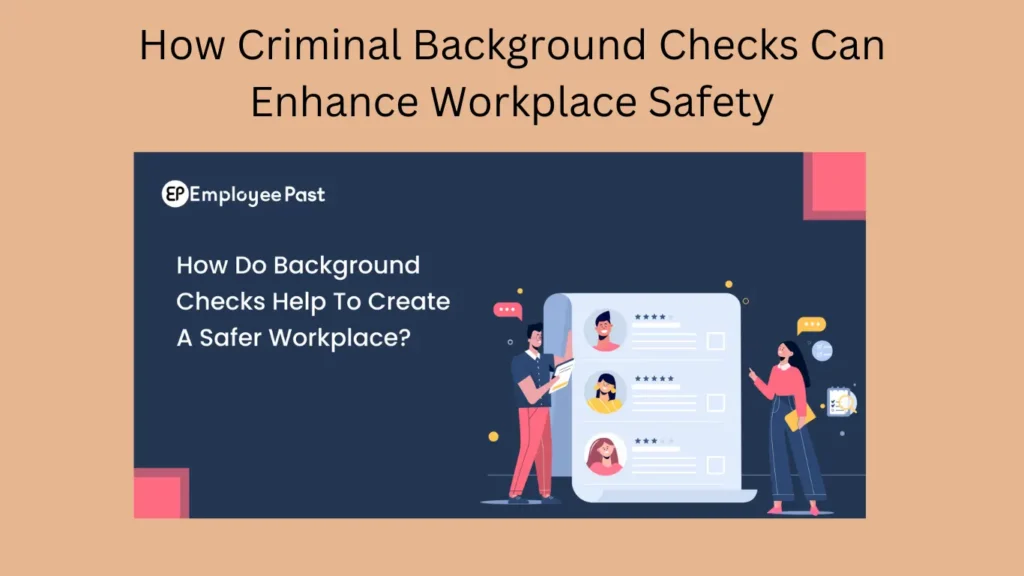Introduction
Criminal background checks play a crucial role in enhancing workplace safety by identifying potential risks and helping employers make informed hiring decisions. This guide explores how criminal background checks can enhance workplace safety and protect your business.
Understanding Criminal Background Checks
A criminal background check involves reviewing an individual’s criminal history to uncover any past convictions, arrests, or legal issues. This process helps employers assess the suitability of candidates for specific roles, ensuring they are hiring individuals who can contribute to a safe and secure work environment.
Key Benefits of Criminal Background Checks for Workplace Safety
- Identifying Potential Risks
- Screening for Violent Behavior: Background checks can reveal past convictions for violent crimes, allowing employers to avoid hiring individuals who may pose a threat to workplace safety.
- Detecting Theft and Fraud: Checking for history related to theft, embezzlement, or fraud helps protect the business from potential internal threats.
- Creating a Safe Work Environment
- Preventing Harm: By identifying individuals with a history of harmful behavior, employers can prevent potential harm to employees, clients, and customers.
- Reducing Workplace Conflicts: Background checks help in hiring individuals with a clean record, thereby reducing the likelihood of conflicts and disruptive behavior in the workplace.
- Ensuring Compliance with Regulations
- Meeting Legal Requirements: Many industries are required by law to conduct criminal background checks to ensure the safety of vulnerable populations, such as healthcare, education, and finance sectors.
- Avoiding Legal Liabilities: Conducting background checks helps protect the business from negligent hiring claims and associated legal liabilities.
- Boosting Employee Morale and Trust
- Fostering a Secure Atmosphere: Employees feel safer and more secure knowing that their employer conducts thorough background checks to maintain a safe workplace.
- Building Trust: A company that prioritizes safety through rigorous screening processes earns the trust and respect of its workforce.
Implementing Effective Criminal Background Checks
- Develop a Comprehensive Policy
- Clear Guidelines: Establish clear policies on when and how background checks will be conducted, ensuring transparency and consistency.
- Legal Compliance: Ensure the policy complies with relevant laws and regulations, such as the Fair Credit Reporting Act (FCRA) and Equal Employment Opportunity Commission (EEOC) guidelines.
- Partner with a Reputable Screening Service
- Accurate and Up-to-Date Information: Choose a screening service that provides accurate and current information from reliable sources.
- Comprehensive Checks: Opt for services that offer comprehensive checks, covering national and local criminal records, sex offender registries, and terrorist watch lists.
- Inform and Obtain Consent from Candidates
- Transparency: Clearly inform candidates about the background check process and obtain their written consent before proceeding.
- Clear Communication: Explain the reasons for conducting background checks and how the information will be used in the hiring decision.
- Evaluate Results with Context
- Relevance to the Job Role: Consider the nature and relevance of any criminal history in relation to the job role. Assess whether the offense impacts the candidate’s ability to perform their duties safely and effectively.
- Maintain Confidentiality
- Protect Privacy: Handle background check information with the utmost confidentiality, ensuring it is only accessible to authorized personnel involved in the hiring process.
- Secure Storage: Store background check reports securely, in compliance with data protection regulations.
Conclusion
Criminal background checks are a vital tool for enhancing workplace safety. By identifying potential risks, creating a safe work environment, ensuring compliance with regulations, and boosting employee morale, these checks help protect your business and its most valuable asset—its people. Implementing effective criminal background checks demonstrates a commitment to safety and security, contributing to the long-term success and integrity of your organization.
For further Inquires Contact Us
FAQs
What does a criminal background check aim to accomplish?
Answer: The purpose of a criminal background check is to provide employers with information about a candidate’s criminal past in order to evaluate their fitness for a position and guarantee workplace safety.
How do criminal background checks enhance workplace safety?
Answer: Background checks identify individuals with a history of violent or harmful behavior, reducing the risk of workplace conflicts and ensuring a safer environment for employees and clients.
What information is included in a criminal background check?
Answer: A criminal background check typically includes national and local criminal records, sex offender registries, and terrorist watch lists, providing a comprehensive view of an individual’s criminal history.
Are there legal requirements for conducting background checks?
Answer: Yes, certain industries are legally required to conduct background checks. Additionally, employers must comply with regulations such as the Fair Credit Reporting Act (FCRA) and Equal Employment Opportunity Commission (EEOC) guidelines.
How should employers handle the results of a background check? Answer: Employers should evaluate the relevance of any criminal history to the job role, consider the context of the offenses, and maintain confidentiality. They should also give candidates a chance to explain any discrepancies.
